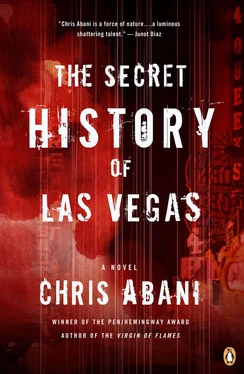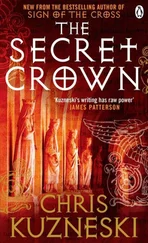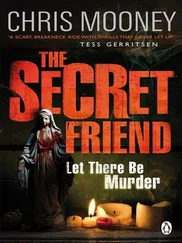I’m not sure. I think I’m just a nerd who thinks she looked her best back in the eighties. I think that it’s more about being a woman that preoccupies me, she said. You know, the cost of the extensive education I’ve had, the demands of the work I do, the expectations I have for myself and also for a partner, all these concern me more than race.
You think these things isolate you, as a woman? Lead to a lonelier life?
Of course they do. There are just fewer men in the world who want or can deal with a black woman like me; even fewer that I want.
Funny, I didn’t even think about that, Sunil said.
Never thought about me as a woman?
I mean, Sunil began, but stopped.
Yeah, well, it’s different for women, Sheila said. Time and all that.
Yes, time and all that, Sunil echoed.
Trying to clear the air, she asked: So — seeing anyone?
It’s complicated, Sunil said.
It always is, Sheila said.
Sunil smiled. He crossed the room and refilled his cup, pausing to inhale the fragrant, woody smell. He loved this blend — all wet forest leaves and warm hearth fires. Sheila watched him.
I’m sorry, he said, catching her look. Would you like some coffee?
She shook her head. No, I don’t want to be up all night.
Right, he said, of course.
When you were a child, did you imagine your life would ever turn out the way it did? I didn’t. I don’t really know what I expected, what I thought it would be like. It’s elusive, like the fragment of a song, or a smell or even a taste, all of which come upon me in the least expected places at the least expected times, she said.
I know what you mean, he said. The smell of pipe tobacco and rain will always remind me of my father, of long drives in a car, none of which are mine or true. Yet sometimes the memory is so visceral it makes me want to cry. And it feels like I know what’s missing but then it’s gone.
In my case, I know exactly what’s missing, she said.
You do?
And then he caught that look in her eye. The one he’d seen so many times. The one she had when she thought he wasn’t looking. And he loved it, the look, the feeling it gave him, like he could fall into it and be in love. But he was already in love, with Asia. And though it made no sense since she was a prostitute and unable to love him back, he couldn’t help it. And what if he gave up Asia and fell for Sheila? What then?
Whatever Sheila saw in his face made her sit up. Look at the time, she said.
Yes, he said.
I must go, she said. I have work.
Yes, me too.
See you tomorrow, then?
Yes, sure.
At the door she paused momentarily, then shut it resolutely behind her.
Sunil knocked on Brewster’s door and entered without waiting. An older, often offensive, and unpleasant man, Brewster had founded the institute thirty years before. His early work had been in the area of group dynamics, a term that was a catchall for all kinds of work and that made Sunil in particular deeply worried. When it came to Brewster, everything sounded like a euphemism for something darker. There were five other projects housed there, all sponsored by the Department of Defense — Psychological Research; Weapons and Applied Tactics; Information Extraction and Analysis; Robotics and Organic Intelligence; and Planetary Resource Management.
Dr. Brewster, Sunil said, I need to talk to you.
As urgent as you might feel that need is, Sunil, you can’t just barge in here. Brewster was wheezing a little from the oxygen pumping from the portable tank, not much bigger than a thermos, in his lab-coat pocket. A hose snaked up to his nose, held in each nostril by a discreet clip. Brewster used the oxygen to stay alert for the long hours he put into work, and at seventy-five he probably needed it.
I just got an order to sign for thirty dead apes, Sunil said.
Brewster looked at Sunil with a blank expression.
Bonobos, Sunil said, as though that would jog Brewster’s memory.
So what? We run a lot of animal experiments here.
So I didn’t authorize any tests on bonobos. I was wondering if you did.
Listen, Sunil, I made it clear when I hired you that you answer to me, did I not?
It’s just that thirty bonobos are a lot, and I wasn’t consulted on it. I would like to be consulted on experiments that are being signed through my lab.
How long have you been here now, Sunil?
Six, seven years, why?
Wrong answer, Brewster wheezed. You should have said, long enough to know that’s just how things run here.
I don’t like wading through shit like this. It’s too much to ask.
Just hold your breath and swim upstream, Sunil. Don’t take it all so personally.
Sunil smiled tightly. He wanted to say that in South Africa it was always personal. But he didn’t.
Brewster was watching Sunil closely.
Fine, Sunil said. He was awkward and uncomfortable as any boy would be in the principal’s office. Just then Sunil’s phone rang.
Take it, Brewster said, waving his approval.
Sunil took out his cell and looked at the caller ID. It was Detective Salazar. He vaguely remembered the man, but he did remember the case from two years ago that had led Salazar to consult him. Dead homeless men dumped out by Lake Mead. Sunil had been brought in as a psychological consultant. But since, unbeknownst to Salazar, the institute had dumped the bodies in the first place, Sunil was really more of a spin doctor. Protecting the institute.
Salazar, he said.
Dr. Singh, so good to get hold of you. I have a problem I think you can help me with.
Listen, now is not a good time—
The bodies have started appearing again.
Sunil looked at Brewster and turned away, thinking, Shit, shit, shit.
I can’t really help, Detective, he said.
Yes, you can. I think we’ve arrested the killer and I need you to come down to County and administer a psychological evaluation.
You caught the killer?
Yes.
So why do you need a psychological evaluation?
It’s complicated.
It always is with you, Salazar.
They are Siamese twins.
Conjoined twins?
Yeah. I found them out by Lake Mead and there seems to be some uncertainty as to whether they were committing suicide or covering up a crime scene.
The duty psychiatrist could handle this, Sunil said.
No, Salazar said. I am convinced it’s the same case we worked on.
Then surely it’s a police matter.
No, I need your help on this.
Okay, look, I’ll call you back in an hour.
Can you make it sooner?
I’ll do my best, Sunil said, hanging up.
What was that about, Brewster asked.
It’s a police matter.
All the more reason I need to know what it’s about, Brewster said. Can’t have any potential security breaches.
Remember the body dumps from two years ago?
Of course, he said.
The police think they’ve found the killer and want a psych eval from me, but I don’t think I’m going to do it.
What’s the matter with you, Sunil? This is perfect for us, and in particular for your project.
The killers are apparently conjoined twins.
Imagine the opportunities. We’ve never had the chance to study the brain chemistry of a monster before.
Sunil flinched at the medical term for genetic abnormalities. I study psychopaths, he said. Not monsters.
And conjoined twins can’t be psychopaths?
They can be, yes. But we have to be careful about finding psychopaths everywhere. My research has to be very focused and free of anything that could devalue its science. Besides, we both know that there is no killer.
There’s always a killer, Sunil, Brewster said with a smile.
Sunil hated Brewster. It was Brewster who said what everyone must have been thinking when they first met Sunil: You don’t look Indian. You are very dark; you look black.
Читать дальше












